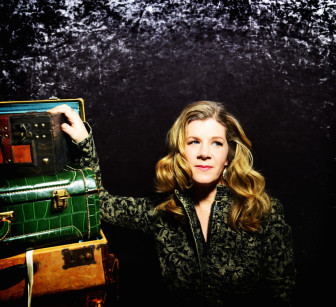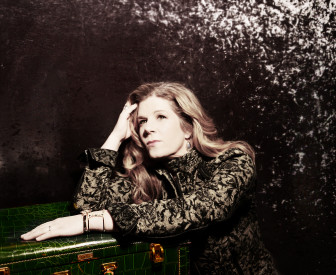[Editor’s note: Harteveld has lived in Maplewood for twenty years and is a mother of a 14-year-old boy and an 11-year-old girl. She works as a major gifts officer.]
In 2003, my husband and I attended an event at the New Jersey State Theater to hear several of our favorite female songwriters. I had listened to Mary Chapin Carpenter growing up, Shawn Colvin in college, and had recently fallen head over heels in love with Patty Griffin. I hadn’t yet heard of Dar Williams – but the opportunity to hear these women play and collaborate together was a huge draw for me.
They were set up on the stage – just four women and their guitars. They shared stories and belted out each other’s favorite songs. I felt like I was a part of an intimate and somewhat impromptu jam session. About a quarter of the way through the concert Williams ripped into “Are You Out There?” and sang with such passion and power that both my husband and I were stunned. Her music has carried me through the last decade and has been a warm friend and guiding voice.
Recently I had the pleasure of interviewing Williams by phone for The Village Green. Williams is playing at the South Orange Performing Arts Center (SOPAC) on December 17 as part of a tour in support of her latest release, “Emerald.” Get tickets on the SOPAC website.
I have seen you in many different venues over the years – outside summer concerts, churches, small theaters – do you have a favorite kind of venue? And why?
I think that playing outdoors is great for audiences and that playing indoors is more predictable for musicians. I love the spirit of outdoor festivals, but the indoor clubs and theaters where you have great sound and everything is in place are so beautiful and comfortable – and a lot of magic can happen.
The truth is that my big joke as I was starting out and playing more with bands is that the worse the club smells when you walk in – the better the gig was going to be. The more it smelled like old beer and cleaning agents and the more your feet stuck to the ground – the better the gig was going to be.
I’m now doing duos and trios and I love the small clubs and theaters where the windows steam up and people are way up close. I didn’t love those until the recession. What I found was that there was so much anxiety and people liked to actually be physically close to each other. That’s what I was kind of feeling, and I came to appreciate that kind of venue. And yes, that means that they can see the run in my stocking and my scuffed up shoes and all those things that you can’t see from far away, but I came to respect how far you can go together with that kind of proximity.
Every time I listen to “When I Was a Boy” I end up in tears. It has always been like someone is capturing actual moments from my life as a mother, and knowing someone else has been there brings me such comfort. I read a couple of other interviews and one of the authors described your writing as having a “reporter’s keen eye and a fiction writer’s feel for nuance”. Do you know that you have that super power? Are you surprised people describe you that way?
I have a good answer for that. There are a lot of singer-songwriters, professionals and non-professionals, who have a lot of gifts for all of those elements that a song can bring you in terms of feeling, detail, phrasing, big picture, small picture. I will tell you that “When I Was a Boy” was basically written at a time when this country was on the cusp of looking at a lot of gender identity – whether they knew it or not – and there had been a lot of feminist songs saying ‘I was like a boy’ or ‘women can do what men can do’. This song says: I ran around and I really thought I was a boy.
And the other thing that song ended up doing that I didn’t realize when I wrote it – it just felt like a riff – was to really take that kind of what people were probably hearing as a very feminist song and spin it to the men. For as much as we have struggled with gender identity, it is the men who are really playing catch up and really having existential loneliness about gender identity.
That song was the key as it gave me confidence and the ability to play music exclusively and to have people trust me enough to listen to the next song. “When I Was a Boy” started a conversation that allowed me to make a living, be trusted and be heard. But I will tell you and this is not modesty, I lead a songwriting retreat and I am out and about a lot and when you show up to hear a performance – it will make you cry every night. And leading my songwriting retreat, I was like ‘oh, you have to be professional and kind of stoic’ – and I had to throw that out by like day three of the first retreat I led. I cry all the time – and I’m fine with that. I just don’t wear mascara any more. So that is true. Songs are powerful and there are a lot of people who get better and better at writing and doing them.
I have met some of the most interesting people while living in Maplewood. Performers on Broadway, editors at major newspapers, leaders in education, producers on national public radio – and like many other adults today we are all striving for better work/life balance. You have such a dynamic career and are involved in so many meaningful civic projects. What advice do you have, as someone who studies life, on work/life balance?
I know how wonderful your community is. I played SOPAC before, and have had the opportunity to collaborate with Julie Burstein who works on Studio 360. She was working with me on developing a podcast on communities. She has amazing radio skills, but is also a very powerful thinker and connector and community builder.
As for your question, I would say two things: if you are a parent, bring your kids into what you do when it works, but don’t kid yourself about what doesn’t work. For my kids, there were a lot of babysitters, extended family, grandparents, day care and I didn’t take them on the road or into the studio. Now that they are getting older, I am really finding ways of bringing my musical life and my kids together. I didn’t have to push it. Now they are seeing what I do and it’s coming together.
Last night, we were practicing a song for a show I am doing tonight, and my daughter sat at the table and she wanted to sing with us. And the person sitting next to her taught her the harmony, and then we heard this little high voice coming in and she just decided that she wanted to do that for a little while. My experience is that sharing my children with the community was only a good thing – paid and unpaid.
The second thought is that I feel like the time we put into our communities, we get back tenfold because it strengthens the community and it also introduces us to a lot of different kinds of people. [Mark] Granovetter, the sociologist, had a theory called “the strength of weak ties” where your network of acquaintances are really your greatest strength. At the end of the day in a community as wonderful as Maplewood, I think you will find this true.
You wrote one of my favorite holiday songs, “Christians and the Pagans” where the main characters oppose each other in every political and cultural way but they are able to come together to break bread and celebrate family. What wisdom does this song hold for our “civil” society today?
I think that if that song is valuable it’s because it’s true. People totally find ways of getting along and they like to and they know how to. Should I have come home and talked about A Clockwork Orange one year at Thanksgiving? No, but I was 19 and I did. Everyone kind of worked around it and my experience is that people accommodate awkwardness. People know what to talk about, get different perspectives and only have to do that for a day. Is it hard for me to hear about Eric Garner and that ‘I didn’t understand what happened because I wasn’t watching the tape from the right angle?’ I can hear that for a day. There’s a thing called wine and you can drink it and then that thing doesn’t bother you so much. I’m all about chosen family if that is what works for you – but people have an innate desire to work it out. I’ve seen it throughout my travels.
The class you teach at your alma mater Wesleyan University, “Music Movements in a Capitalist Democracy” intrigues me. How do you choose your civic projects? What role does music play in it? How do you think someone without a platform can enact change?
I choose my projects based on a ground floor philosophy of what builds the greater good. I like to support the things that ultimately will connect people in such a way that they will keep things going and then grow in different directions. So – gardens are always a good idea, supporting cultural centers is a good idea, supporting schools and tonight I’m doing something local for an organization that does do a lot to connect the hiking trails and make them safe and clean. I like to support the things that out of which all different sorts of community relationships are built.
As for my course, I learned a lot from it. The course I taught is about how music is a great way to bring people into a movement, to sustain a movement, and to even archive a movement. To hold our collective memory of the importance of that movement wherever it went — from civil rights to the Woodstock generation, all of those advances, the black power movement, the feminist movement, the songs from those time periods hold all that history in them. So, I think music is extremely important and the ability to make music together is very important.
As for music in storytelling, it makes it more three dimensional. It holds together a little better. I think all storytelling mediums are very powerful, but music itself is an invisible language that communicates in a very powerful way. So, when that is in relationship with words and everything else it has the potential to send the message even farther. But, I am a huge fan of spoken word and storytelling. I think we need them all.
Tell me about your affection for New York City. Do you have a favorite neighborhood in New York?
I lived on the Upper West Side for many years, and I loved it. I think I still love it – you get a lot of money there, but you also get a lot of people walking around with a white ponytail shaking their head saying “Whatever happened to the revolution?!?” You get some really good old guard in that neighborhood. That’s my favorite New York.



